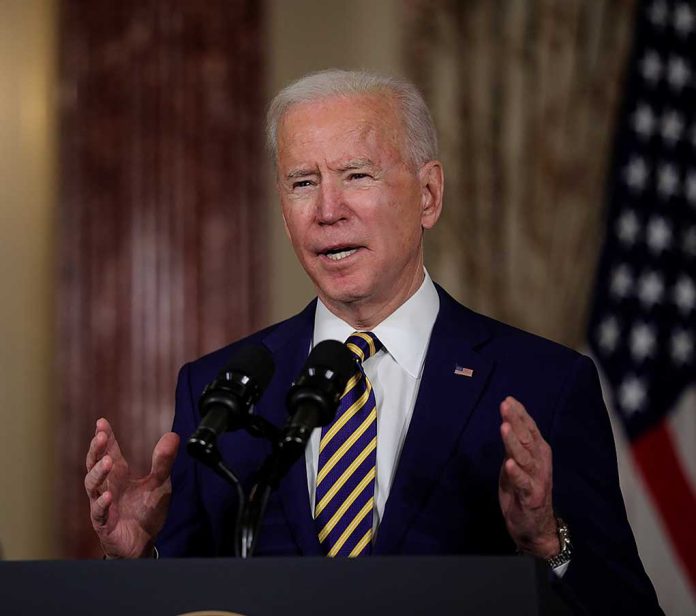
Justice Department rescinds Biden-era protections, allowing prosecutors to once again target journalists in leak investigations with subpoenas and search warrants.
Key Takeaways
- Attorney General Pam Bondi has revoked protections that prevented prosecutors from seizing journalists’ records, citing recent classified information leaks.
- The new policy allows subpoenas, court orders, and search warrants to compel reporters to provide information or testimony with approval from DOJ leadership.
- This marks a return to more aggressive approaches used during previous administrations, raising concerns about press freedom and journalistic independence.
- The policy change comes amid active criminal investigations into leaks of intelligence documents to The New York Times.
- Homeland Security and the FBI are simultaneously pursuing charges against officials leaking deportation operation details.
Justice Department Reverses Media Protections
The Justice Department under President Trump’s administration has officially rescinded Biden-era policies that restricted prosecutors from seizing reporters’ records during leak investigations. Attorney General Pam Bondi announced the policy change, which now permits the use of subpoenas, court orders, and search warrants to obtain information and testimony from journalists. This significant shift comes in response to what Bondi described as recent leaks of classified information to news organizations, specifically citing incidents involving The New York Times. The policy reversal signals a renewed focus on addressing unauthorized disclosures of sensitive information to the press.
The policy change necessitates that such actions receive approval from Justice Department leadership and require advance notice to journalists. Additionally, any efforts to question or arrest members of the news media must receive explicit approval from the Attorney General herself. Bondi emphasized that these investigative techniques would be deployed as narrowly as possible to avoid unnecessarily interfering with legitimate news gathering activities. This approach marks a return to tactics more commonly employed during both the Obama and first Trump administrations.
National Security Concerns vs. Press Freedom
In her directive, Bondi made clear that the primary motivation behind the policy shift is to identify and punish government employees who improperly leak sensitive information. The Attorney General stated the Justice Department’s position in no uncertain terms regarding unauthorized disclosures. “Federal government employees intentionally leaking sensitive information to the media undermines the ability of the Department of Justice to uphold the rule of law, protect civil rights, and keep America safe. This conduct is illegal and wrong, and it must stop,” Bondi declared in her memo outlining the changes.
“Federal government employees intentionally leaking sensitive information to the media undermines the ability of the Department of Justice to uphold the rule of law, protect civil rights, and keep America safe. This conduct is illegal and wrong, and it must stop,” said Pam Bondi.
The timing of this policy shift coincides with recently opened criminal investigations into leaks of intelligence documents reported by The New York Times. Simultaneously, Homeland Security Secretary Kristi Noem and the FBI are actively pursuing charges against officials suspected of leaking details about deportation operations. The convergence of these investigations with the policy change suggests a coordinated effort to tighten control over information flow from government sources to news organizations. FBI Director Kash Patel had previously expressed intentions to target journalists reporting on sensitive political matters.
The Justice Department has rescinded a policy implemented during the Biden administration that restricted prosecutors from seizing reporters' records in criminal investigations, according to an internal memo obtained by ABC News. https://t.co/wVSJfDc6zi
— ABC News (@ABC) April 28, 2025
Balancing Journalism and Security Interests
The Biden-era policy, which was formally codified in 2022, had largely prohibited prosecutors from using subpoenas or search warrants to seize reporters’ records. This policy was implemented following controversial incidents during the previous Trump administration when reporters’ records were secretly seized. The now-rescinded protections were designed to safeguard press independence and prevent unreasonable impairment of news gathering activities. The Justice Department’s Office of Legal Policy has been directed to publish new guidelines that will include procedural protections for obtaining information from media sources.
“Some of the most consequential reporting in U.S. history — from Watergate to warrantless wiretapping after 9/11 — was and continues to be made possible because reporters have been able to protect the identities of confidential sources and uncover and report stories that matter to people across the political spectrum,” Bruce Brown said.
While acknowledging the importance of press freedom, Bondi qualified her statement by referencing what she termed as “the lack of independence of certain members of the legacy news media.” This qualification suggests potential selectivity in how the new policies might be applied to different news organizations. Bruce Brown from the Reporters Committee for Freedom of the Press has expressed concern about the implications of the policy change, emphasizing the historical importance of journalists’ ability to protect confidential sources in reporting matters of significant public interest across political divides.
Sources:
- Trump DOJ rescinds Biden-era protections for news media
- Justice Department revokes Biden-era protections for reporters in leak investigations : NPR




